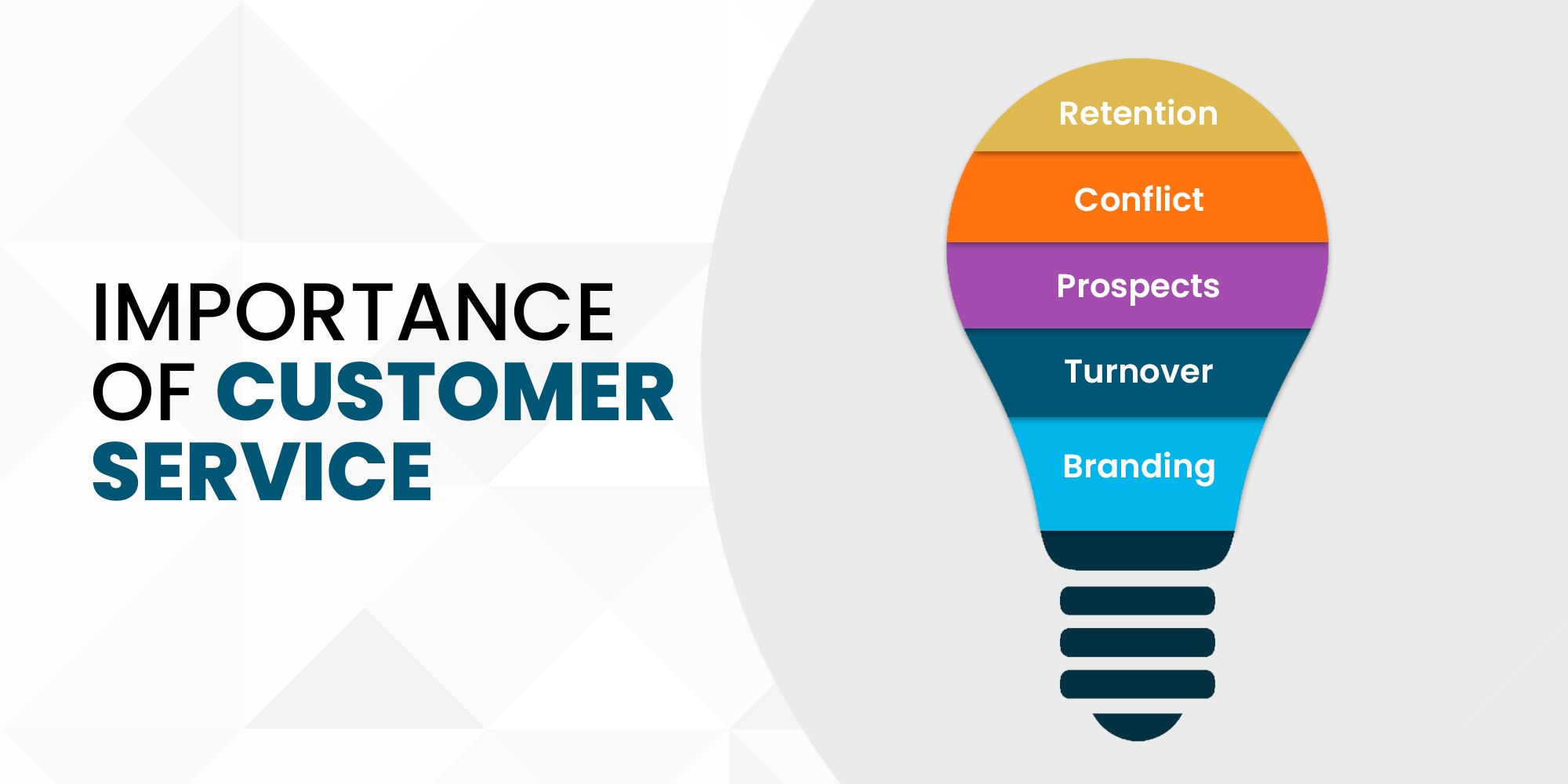
In a rapidly evolving business landscape, providing exceptional customer service has become a crucial element for driving business growth and maximizing return on investment (ROI). Customers now demand more than just a product or service; they seek personalized, attentive, and empathetic experiences that foster loyalty and long-term relationships. In this blog, we will explore 25 specific customer service skills that focus on empathy, active listening, and technical adaptability, supported by relevant statistics to highlight their business impact.

Why is Customer Service Important?
The importance of customer service cannot be overstated. Studies show that 86% of customers will stop doing business with a company after a bad experience, making every support interaction critical for acquisition, retention, and upselling.
Good customer service goes beyond satisfaction; it becomes a revenue generator by providing customers with a seamless experience aligned with the organization’s purpose.
cost of poor customer service is substantial, with U.S. companies losing over $62 billion annually. On the other hand, delivering great service can lead to increased customer spending, as seven out of 10 consumers are willing to pay more for exceptional experiences.
Recognizing customer service as the foundation of the overall customer experience allows businesses to delight customers and create exciting new engagement opportunities.
Customer service skills play an integral role in shaping a company’s growth trajectory. By prioritizing empathy, active listening, and technical adaptability, businesses can elevate their ROI through increased customer loyalty, reduced operational costs, and amplified brand reputation. Investing in developing a skilled and customer-centric service team should be a strategic priority for any organization looking to thrive in today’s competitive market.
The Evolution of Customer Service
Customer service has evolved over time, with various interpretations across organizations. However, viewing it merely as a cost-cutting measure will not lead to success. The truth is, exceptional customer service is a growth center, not a cost center – it’s that straightforward.
Read more about it here :- Evolution of customer service
Dealing with a Team Lacking Essential Customer Service Skills?
If your support professionals show resistance to improving their customer service approach and lack the necessary customer handling skills, there’s a solution. The root cause may be an environment that didn’t reward exceptional service.
To address this, provide clear guidelines and examples of excellent customer service specific to your company, incorporating all the essential customer support skills. Celebrate small wins as your team starts using these skills, acknowledging and rewarding their efforts. As engagement increases, you’ll identify any real skill gaps that need attention.
25 Essential Customer Service Skills
1.) Empathy – Connecting on an Emotional Level:
Empathy is the cornerstone of exceptional customer service. When customers feel understood and valued, they are more likely to become loyal advocates. According to a recent survey, 79% of consumers prefer brands that show empathy, while 82% are likely to switch brands if they feel undervalued.
2.) Active Listening – Building Trust and Loyalty:
Listening actively to customers’ concerns, feedback, and needs demonstrates genuine care and fosters trust. Companies that prioritize active listening experience a 15% increase in customer retention rates and a 50% higher customer lifetime value.
3.) Technical Adaptability – Meeting Modern Demands:
In today’s tech-savvy world, technical adaptability is vital. 63% of customers expect companies to offer support using the latest technologies. Businesses that invest in training their customer service staff in technical skills see a 30% reduction in support resolution time and a 25% increase in customer satisfaction.
4.) Personalization – Elevating Customer Experience:
Personalizing interactions based on customer data yields significant rewards. A study by Salesforce found that 74% of customers are likely to switch brands if the purchasing process feels impersonal, while 91% are more likely to shop with businesses that provide relevant, personalized recommendations.
5.) Time Management – Reducing Response Times:
Speed is of the essence in customer service. A study by Forrester reveals that 73% of customers consider valuing their time as the most important factor a company can offer. Reducing response times leads to a 65% increase in customer satisfaction.
6.) Conflict Resolution – Turning Challenges into Opportunities:
Effective conflict resolution can turn disgruntled customers into loyal brand advocates. Data shows that customers who have their issues resolved are 70% more likely to recommend the company to others.
7.) Communication Skills – Conveying Professionalism:
Excellent communication skills are vital for customer service representatives. Companies that invest in communication training experience a 40% improvement in first-call resolution rates, resulting in greater customer satisfaction.
8.) Product Knowledge – Upselling and Cross-selling Opportunities:
Representatives with in-depth product knowledge can effectively upsell and cross-sell to customers. A survey by Accenture found that 43% of consumers spend more money on brands that they believe to be knowledgeable.
9.) Positive Language – Creating a Lasting Impression:
Using positive language and expressions can enhance customer interactions significantly. Customers who have positive experiences are 85% more likely to make repeat purchases.
10.) Multilingual Support – Expanding Global Reach:
Businesses that provide multilingual support enjoy a 45% higher customer retention rate among non-English-speaking customers, allowing them to expand their global reach and tap into new markets.
11.) First Call Resolution – Enhancing Customer Loyalty:
First call resolution (FCR) is a critical metric for customer service success. A study by SQM Group indicates that businesses with a high FCR rate (80% or above) experience a 10-15% increase in customer loyalty.
12.) Emotional Intelligence – Nurturing Brand Advocates:
Customer service representatives with high emotional intelligence create deeper connections with customers. Studies show that emotionally intelligent service reps have 50% more satisfied customers and contribute to a 22% increase in customer retention.
13.) Patience – Exceeding Customer Expectations:
Patient service representatives leave a lasting impression on customers. According to a study by American Express, 67% of customers have hung up the phone out of frustration when they couldn’t reach a real person. Patience can significantly reduce call abandonment rates and increase customer satisfaction.
14.) Problem-solving Skills – Retaining Customers:
Efficient problem-solving skills can save customer relationships. A study by Lee Resources International found that customers who have their problems resolved are 88% more likely to stay with the company.
15.) Upselling/Cross-selling – Maximizing Customer Value:
Upselling and cross-selling efforts contribute to higher revenues. Research from Predictive Intent shows that successful upselling and cross-selling can account for 10-30% of a business’s total revenue.
16.) Knowledge Base Utilization – Empowering Customers:
A well-maintained knowledge base empowers customers to find solutions independently. Implementing a knowledge base can lead to a 20% decrease in support ticket volume.
17.) Omnichannel Support – Delivering Seamless Experiences:
Companies that provide omnichannel support retain 89% of their customers on average, compared to 33% retention for companies with weak omnichannel strategies.
18.) Resilience – Overcoming Service Challenges:
Resilient customer service reps can turn challenging situations into opportunities. A study by Customer Service Institute of America shows that customers who have their issues resolved after a negative experience are 70% more likely to return as customers.
19.) Proactivity – Anticipating Customer Needs:
Proactively addressing customer needs improves satisfaction and loyalty. A Gartner study reveals that 82% of customers are satisfied when service reps anticipate their needs, leading to increased customer retention.
20.) Adaptability – Meeting Dynamic Demands:
Businesses with adaptable customer service teams experience a 23% higher customer retention rate than those with inflexible teams. Adaptability allows companies to stay ahead of changing customer expectations.
21.) Social Media Savvy – Amplifying Brand Presence:
Engaging customers on social media can significantly impact brand loyalty and reputation. Convince & convert found that 71% of customers who experience positive social media interactions with a brand are likely to recommend it to others.
22.) Data Privacy Awareness – Building Trust:
Customers value their data privacy highly. A Salesforce survey indicates that 65% of customers are more likely to switch brands if they feel their data is not handled properly.
23.) Persuasion – Influencing Purchase Decisions:
Persuasive service reps can effectively guide customers towards purchase decisions. RAIN Group found that persuasive communication increases the likelihood of closing a deal by 43%.
24.) Self-Service Enablement – Improving Efficiency:
Implementing self-service options can reduce service costs significantly. CRM Magazine reports that self-service can save businesses up to $11 per customer interaction.
25.) Customer Feedback Utilization – Driving Continuous Improvement:
Customer feedback is invaluable for improving service quality. According to CustomerThink, companies that leverage customer feedback experience a 10% increase in customer satisfaction.
Conclusion
Exceptional customer handling skills, such as empathy, active listening, and technical adaptability, have a profound impact on a company’s ROI. By investing in these essential customer support skills, businesses can nurture long-lasting customer relationships, drive loyalty, and stay ahead of their competitors. In today’s customer-centric era, the real competitive advantage lies in delivering unparalleled customer experiences that foster growth and sustainable success.


